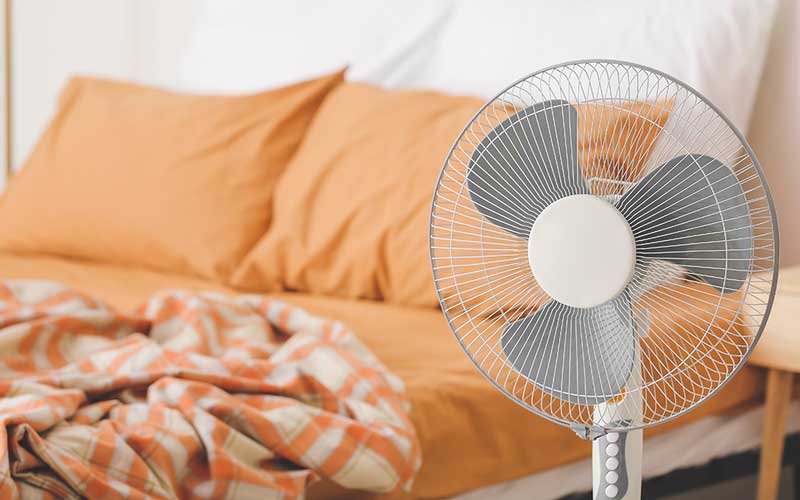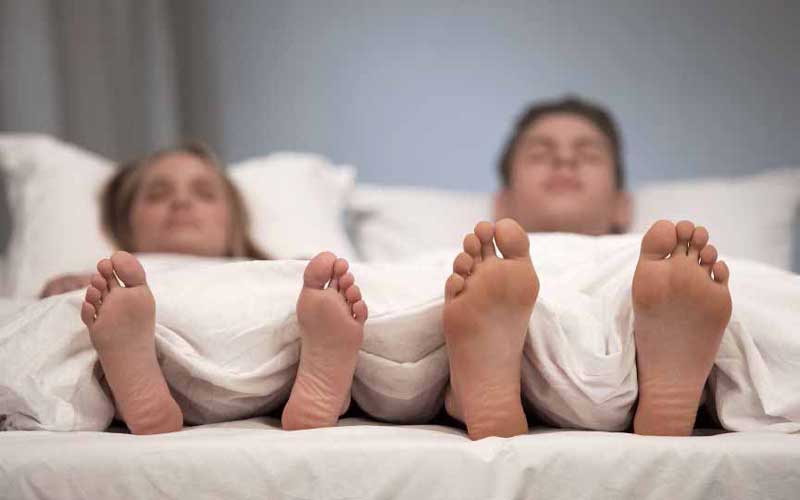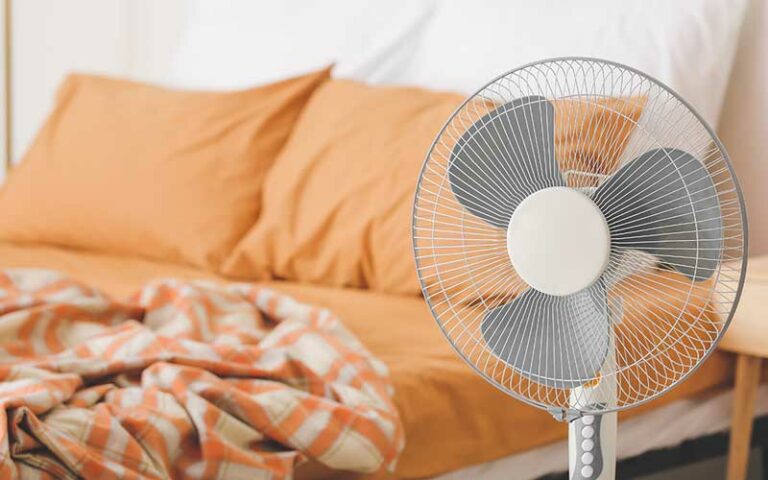Healthy sleep can be achieved by being in a comfortable sleep environment. The ideal temperature for your sleeping quarters is 18 degrees Celsius, give or take a few degrees. A cool, but not cold, the room will help you sleep through the night because your body’s temperature decreases during sleep.
It is possible for infants to need a slightly higher room temperature in order to sleep, but you should not turn the thermostat up more than a few degrees, so their bodies don’t get overheated. In today’s guide, we will be discussing the best temperature for sleep for both infants and adults, as well as talk about how the bedroom temperature can affect your sleep.
What’s the best sleep temperature for infants?

An infant can benefit from a bedroom that is one or two degrees warmer. This is because their bodies are still developing, and they are more sensitive to temperature changes in the ambient.
However, the risk of sudden infant death syndrome (SIDS) increases when the bedroom is too warm. Therefore, it is recommended to use approved sleepwear, avoid heavy blankets or multiple layers, and set the thermostat to ensure a favourable temperature. Parents can check their baby’s temperature by touching their stomach or neck at night.
According to research, babies achieve temperature maturation at the age of 1. They begin to reach a minimum core body temperature of 36.4 degrees Celsius within four hours of sleeping, similar to adults.
Keep in mind that, just like us, babies need comfort to sleep soundly, which is why you should be careful when picking a cot bed as well.
How does temperature affect sleep?

Good nighttime sleep can be achieved with a room temperature of around 18.3C. That’s because your body’s internal temperature regulation relates to this. The temperature of your body changes during a 24 hour period, which is known as a circadian rhythm. Your body begins to warm up about the time you go to bed and continues to cool down until it reaches its lowest point in the early hours of the morning.
The blood vessels in your skin expand to help cool you down. You may notice that your hands and feet get warmer when the temperature drops. That’s due to your core temperature being reduced because your body is releasing heat through them.
If the temperature in your bedroom environment is too hot or cold, you might have trouble sleeping. Several studies found that the temperature of your bedroom is the most crucial factor in achieving quality sleep.
Sleep tips for the best bedroom environment

Having a good night’s sleep is essential for your body to function correctly. This is why it’s essential to set the stage for healthy rest. There are some tips on how to make an environment better suited for a deep slumber. They are the following:
Regulate room temperature
It’s important to make sure your room stays between 18.6 and 19.4C at night. You can do so by:
- When you are sleeping, set your home’s thermostat to go down. You can keep your temperature slightly warmer during the day but set it cooler at night so you don’t overheat and sweat.
- If the temperature in the room is outside of the recommended sleeping range, you should open your windows, turn on the air conditioning or use a fan. To regulate the temperature in your sleeping quarters, you might want to install a thermostat.
- Air circulation is crucial, especially in the hot summer months, which is why we recommend you run an air conditioner or fan to cool the temperature of the room.
- It would be best if you also thought about controlling the air humidity in your bedroom since it can also be a reason for sleep disturbance. You can do so by getting an air dehumidifier.
Different bedding for hot and cold weather
When summer arrives, the down comforter you use in the winter may be inappropriate. Thus, it is advisable to keep a lightweight blanket on your bed during the hot months. However, if there is a cold snap, you may need to add another blanket on top of your comforter in order to get more warmth. Overall, you can reduce sweating with a breathable cooling mattress, sheets, duvet, comforter, pillow, and lose pyjamas.
No caffeine in the evening
It can be challenging to fall asleep at night if you drink coffee, tea, or soda all day. Therefore, it is advisable to drink decaffeinated beverages after a certain time of day, so you can fall asleep with ease. If you want to learn more on the subject, check our guide on the most useful drinks to have before bed.
Dark room environment
It’s a good idea to think of your bedroom as a cave when you sleep. We mean that if you want to avoid streetlights or sunlight entering your bedroom, cover the windows with curtains or blinds. You might want to consider removing electronic devices as well since they emit light, such as blinking lights, computer monitors, or phones. Generally, by keeping your blinds closed, you reduce heat build-up during the day.
Quiet ambience
The noise in your bedroom may distract you from falling asleep, or it can wake you up at night. If you can’t keep others from making noise in your bedroom, consider a white noise machine or earplugs. This way, you will promote a better sleep environment for yourself and your partner (if you have one)
Have a sleep routine
When it comes to healthy sleep, you should keep your body’s rhythm in mind. It’s better to go to bed at the same time each day so that your body can adapt to a certain routine. If you have blue-light emitting screens, power them down at least half an hour before bed. Before you turn off the light for the night, consider reading a book or doing some sort of breathing exercises.
What happens when your bedroom is too hot?

It is hard to sleep when you are sweaty and dehydrated, and anyone who has slept in a stuffy bedroom knows that. Bedrooms that are too warm can affect your body’s thermoregulation abilities and even cause fatigue. Even though it might not make sense for some individuals, a fatigued person can’t fall asleep because they are too tired.
Your body temperature influences the time spent in different sleep stages. For example, slow-wave sleep and subjective sleep quality can be affected by a higher core body temperature. A more significant difference in temperature between the core and the extremities is associated with decreased sleep efficiency and a higher chance of waking up in the middle of the night after falling asleep.
During the REM stage, the body ceases most temperature-regulation behaviours such as sweating or shivering, leaving you more sensitive to temperature changes. Therefore, excessively hot bedroom temperatures also appear to lessen the time spent in this sleep stage.
The immune system, as well as learning, memory, and other processes, can be impacted by a decrease in REM and slow-wave sleep. The ideal room temperature varies from person to person based on their body type and personal preference. The average recommended range of temperatures in which people should sleep are:
- For children under 5 years old: 19 – 21°C
- For older children or teenagers: 18 – 20°C
- For adults between 18-65 years old: 18.3 – 19.4°C
Bottom line
Before you close your eyes at night, make sure the temperature where you sleep is on the cooler side. This will make it easier for you to get to bed and stay asleep each night.
The ideal temperature for your bedroom is between 18.3 and 19.4C. Infants might need a warmer environment at times, but generally, they should also be able to sleep in these temperatures with the proper sleep attire.
Overall, you should make sure the temperature in your room is appropriate for your body to fall into deep slumber without overheating. Don’t forget to think about the bedding you’re using and the materials it is made from. Cooler temperatures help with your blood flow and promote a comfortable environment for sleep.
Now it’s our turn to hear from you if any questions regarding the subject were left unanswered. If you want to share some information, we would gladly hear about it in the comments below.

